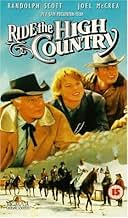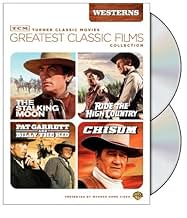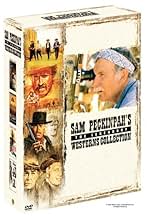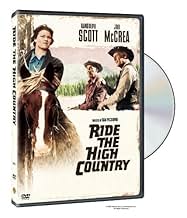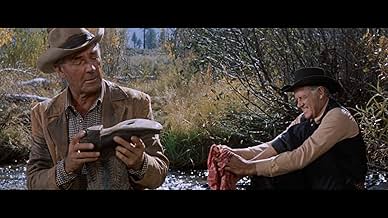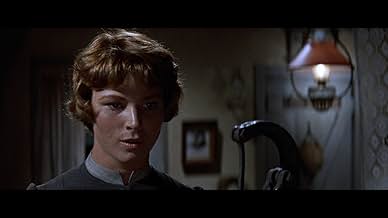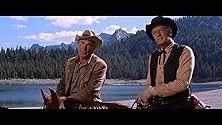An ex-union soldier is hired to transport gold from a mining community through dangerous territory. But what he doesn't realize is that his partner and old friend is plotting to double-cross... Read allAn ex-union soldier is hired to transport gold from a mining community through dangerous territory. But what he doesn't realize is that his partner and old friend is plotting to double-cross him.An ex-union soldier is hired to transport gold from a mining community through dangerous territory. But what he doesn't realize is that his partner and old friend is plotting to double-cross him.
- Director
- Writers
- Stars
- Nominated for 1 BAFTA Award
- 2 wins & 2 nominations total
Alice Allyn
- Candy
- (uncredited)
George Bell
- Townsman
- (uncredited)
Oscar Blank
- Miner
- (uncredited)
Chet Brandenburg
- Miner
- (uncredited)
Don Brodie
- Spieler
- (uncredited)
Chris Carter
- Rose
- (uncredited)
- Director
- Writers
- All cast & crew
- Production, box office & more at IMDbPro
7.415.8K
1
2
3
4
5
6
7
8
9
10
Featured reviews
Justified
It was goodbye to two stars from the golden age of Westerns and hello to a director who would help transform the genre into something bloodier, nastier, and truer. A skillful compromise of those visions, "Ride The High Country" presents a kind of crossroads that feels more like a destination, a perfect summing-up of the legend and the reality of the American West.
Steve Judd (Joel McCrea) is a weary old lawman trying to make ends meet as he nears the end of the road. To transport some gold from a mining town to a bank, he takes on the services of an old buddy, Gil Westrum (Randolph Scott). Westrum's as sleek and angling as Judd is square, and has more on his mind than collecting $10 a day risking his neck guarding someone else's money. While this remains unsettled, the pair gets mixed up with a woman (Mariette Hartley) who thinks she's in love with a miner whose idea of a honeymoon means sharing the wealth with his hideous brothers.
Ask anyone with a glancing knowledge of films what kind of movies Sam Peckinpah made, and they will likely describe a movie very different from this. There's some shooting, a little blood, and an unshaven Warren Oates, but otherwise "Ride The High Country" is a movie in the classic Western mold. There are some dissonances for Scott and McCrea's old-time fans to sort through, like Scott's ambiguous morality, but this is all-in-all the nicest movie Peckinpah ever made, decent characters set against an inspiring landscape, the kind of yarn John Ford or Anthony Mann would have delivered.
Not that everything is too black-and-white. The girl, having escaped her stern father and the stump farm where they lived, asks Judd at one point about right and wrong: "It isn't that simple, is it?" "No, it isn't," Judd replies. "It should be, but it isn't."
McCrea is the center of this film, a pillar of virtue. He quotes the Bible, but it's not clear he's especially religious or just stoic in the classic tradition. When he talks about his simple desire "to enter my house justified," he may have the Christian meaning in mind, or just the humanistic ideal of having been a good man when all is said and done. Nevertheless, there are intimations of a deeper truth in the redemption of Westrum and his unambiguous last line: "I'll see you later."
Peckinpah does present a bull-headed Christian zealot in R.G. Armstrong as the girl's father, but he's essentially decent, afraid of life, what it did to him and can do to her. Some see a suggestion of incest in their relationship, when she tells him he doesn't want her with any man but him, but it's more likely that's her complaining about his being overprotective.
There's a lot of humor here, too, much of it courtesy of Randolph Scott. Scott could be a stiff in other films; here he settles nicely into the role of a cut-up, like when he watches his young charge Heck get the tar beaten out of him twice without lifting a finger to help him. "Good fight, I enjoyed it," Westrum chirps as the boy licks his wounds.
The film culminates in a good fight with the Hammonds, so ornery they jeer at Heck when he brings the girl to their doorstep and she assures them he was a gentleman: "How come? Something wrong with him?" It's the one gunfight in the film, and though its one more than some Peckinpah films like "Junior Bonner" had, it's another reason for the film sticking out as unusual in the director's oeuvre.
But it's a good kind of difference, for the most part, as Peckinpah finds his métier while paying tribute to those who came before him with the help of McCrea and Scott. Like its heroes, "Ride The High Country" moves a little slowly in parts, but watching it, you'll likely agree with me the long journey is worth the ride.
Steve Judd (Joel McCrea) is a weary old lawman trying to make ends meet as he nears the end of the road. To transport some gold from a mining town to a bank, he takes on the services of an old buddy, Gil Westrum (Randolph Scott). Westrum's as sleek and angling as Judd is square, and has more on his mind than collecting $10 a day risking his neck guarding someone else's money. While this remains unsettled, the pair gets mixed up with a woman (Mariette Hartley) who thinks she's in love with a miner whose idea of a honeymoon means sharing the wealth with his hideous brothers.
Ask anyone with a glancing knowledge of films what kind of movies Sam Peckinpah made, and they will likely describe a movie very different from this. There's some shooting, a little blood, and an unshaven Warren Oates, but otherwise "Ride The High Country" is a movie in the classic Western mold. There are some dissonances for Scott and McCrea's old-time fans to sort through, like Scott's ambiguous morality, but this is all-in-all the nicest movie Peckinpah ever made, decent characters set against an inspiring landscape, the kind of yarn John Ford or Anthony Mann would have delivered.
Not that everything is too black-and-white. The girl, having escaped her stern father and the stump farm where they lived, asks Judd at one point about right and wrong: "It isn't that simple, is it?" "No, it isn't," Judd replies. "It should be, but it isn't."
McCrea is the center of this film, a pillar of virtue. He quotes the Bible, but it's not clear he's especially religious or just stoic in the classic tradition. When he talks about his simple desire "to enter my house justified," he may have the Christian meaning in mind, or just the humanistic ideal of having been a good man when all is said and done. Nevertheless, there are intimations of a deeper truth in the redemption of Westrum and his unambiguous last line: "I'll see you later."
Peckinpah does present a bull-headed Christian zealot in R.G. Armstrong as the girl's father, but he's essentially decent, afraid of life, what it did to him and can do to her. Some see a suggestion of incest in their relationship, when she tells him he doesn't want her with any man but him, but it's more likely that's her complaining about his being overprotective.
There's a lot of humor here, too, much of it courtesy of Randolph Scott. Scott could be a stiff in other films; here he settles nicely into the role of a cut-up, like when he watches his young charge Heck get the tar beaten out of him twice without lifting a finger to help him. "Good fight, I enjoyed it," Westrum chirps as the boy licks his wounds.
The film culminates in a good fight with the Hammonds, so ornery they jeer at Heck when he brings the girl to their doorstep and she assures them he was a gentleman: "How come? Something wrong with him?" It's the one gunfight in the film, and though its one more than some Peckinpah films like "Junior Bonner" had, it's another reason for the film sticking out as unusual in the director's oeuvre.
But it's a good kind of difference, for the most part, as Peckinpah finds his métier while paying tribute to those who came before him with the help of McCrea and Scott. Like its heroes, "Ride The High Country" moves a little slowly in parts, but watching it, you'll likely agree with me the long journey is worth the ride.
Classic Western
Ride the High Country (1962)
*** (out of 4)
Sam Peckinpah directed western has Joel McCrea and Randolph Scott going into the mining country to bring gold down to a bank but Scott has a different set of plans. After hearing so much praise about this film I can't help but be somewhat letdown because there really isn't anything original here or anything too different than what we've seen before. The biggest aspect is seeing McCrae and Scott doing great work again and I really enjoyed the comic relief. The biggest problem with the film is the side story with the girl and things go downhill once they arrive at the mining town. A great music score and beautiful locations are another plus.
*** (out of 4)
Sam Peckinpah directed western has Joel McCrea and Randolph Scott going into the mining country to bring gold down to a bank but Scott has a different set of plans. After hearing so much praise about this film I can't help but be somewhat letdown because there really isn't anything original here or anything too different than what we've seen before. The biggest aspect is seeing McCrae and Scott doing great work again and I really enjoyed the comic relief. The biggest problem with the film is the side story with the girl and things go downhill once they arrive at the mining town. A great music score and beautiful locations are another plus.
Revisonist splendour as Peckinpah starts his thematic obsession.
"All I want is to Enter My House Justified"
Sam Peckinpah's second feature film is today standing up as a must see and must own for those interested in the Western genre.
The film sees ageing lawman Steve Judd land a job of escorting a gold shipment safely to a bank in Hornitos. After running into old friend, and fellow aged lawman Gil Westrun, he hires both he and his young sparky sidekick Heck Longtree to hopefully see the job through to a successful conclusion. Yet Gil has other ideas, for where Steve is upstanding and adhering to the values he has lived his life by, Gil sees this as one last chance to actually get a big payday. The journey takes a further twist as the three men meet and then save Elsa Knudsen from a brutal marriage, it's an incident that puts them all on a collision course with the Hammond brothers.
What we have here is Sam Peckinpah's first film dealing with men who have outlived their time. We witness some emotionally poignant stuff as the two main protagonists know that they have aged beyond their world, yet as alike as they are, they have different ideals in how to deal with the advent of time. The masterstroke here is the casting of genre legends Joel McRea & Randolph Scott as Steve & Gil respectively. It's evident from the off that both men are identifying with their characters, with both men hitting top emotional form to fully realise the thematic heart of the story. Mariette Hartley makes her film debut as Elsa, and she fits in nicely with the quality on show behind and in front of the camera. Lucien Ballard's cinematography is gorgeous as the various California locations envelope the protagonists in a sort of elegiac way, and Peckinpah directs with his heart as well as his head.
Bookended by two heart-achingly super sequences, of which the finale has rightly passed into Western genre legend, this really is a strong and beautiful film, one that simultaneously shows a truly great director was at work. For here he was left alone, and the final result is a quality Western beating far more than just a cowboy heart. The supporting cast is strong, notably Edgar Buchanan, L.Q. Jones & John Anderson, while the undervalued George Bassman provides a narratively fitting tonal music score. If there is a criticism? it's that Peckinpah doesn't let the younger characters breath, but given the film's core focus on aged men in an aged passing era, well it's easily forgiven. A precursor to The Wild Bunch for sure, but while the theme is the same for both films, this one impacts in a very different way. Highly recommended, not just for the Oater crowd, but for fans of classic cinema too. 9/10
Sam Peckinpah's second feature film is today standing up as a must see and must own for those interested in the Western genre.
The film sees ageing lawman Steve Judd land a job of escorting a gold shipment safely to a bank in Hornitos. After running into old friend, and fellow aged lawman Gil Westrun, he hires both he and his young sparky sidekick Heck Longtree to hopefully see the job through to a successful conclusion. Yet Gil has other ideas, for where Steve is upstanding and adhering to the values he has lived his life by, Gil sees this as one last chance to actually get a big payday. The journey takes a further twist as the three men meet and then save Elsa Knudsen from a brutal marriage, it's an incident that puts them all on a collision course with the Hammond brothers.
What we have here is Sam Peckinpah's first film dealing with men who have outlived their time. We witness some emotionally poignant stuff as the two main protagonists know that they have aged beyond their world, yet as alike as they are, they have different ideals in how to deal with the advent of time. The masterstroke here is the casting of genre legends Joel McRea & Randolph Scott as Steve & Gil respectively. It's evident from the off that both men are identifying with their characters, with both men hitting top emotional form to fully realise the thematic heart of the story. Mariette Hartley makes her film debut as Elsa, and she fits in nicely with the quality on show behind and in front of the camera. Lucien Ballard's cinematography is gorgeous as the various California locations envelope the protagonists in a sort of elegiac way, and Peckinpah directs with his heart as well as his head.
Bookended by two heart-achingly super sequences, of which the finale has rightly passed into Western genre legend, this really is a strong and beautiful film, one that simultaneously shows a truly great director was at work. For here he was left alone, and the final result is a quality Western beating far more than just a cowboy heart. The supporting cast is strong, notably Edgar Buchanan, L.Q. Jones & John Anderson, while the undervalued George Bassman provides a narratively fitting tonal music score. If there is a criticism? it's that Peckinpah doesn't let the younger characters breath, but given the film's core focus on aged men in an aged passing era, well it's easily forgiven. A precursor to The Wild Bunch for sure, but while the theme is the same for both films, this one impacts in a very different way. Highly recommended, not just for the Oater crowd, but for fans of classic cinema too. 9/10
"All I want is to enter my house justified."
Aging ex-lawman Joel McCrea is hired to protect gold shipment and asks old friend Randolph Scott to join him. Scott brings a young sidekick (Ron Starr) with him and has intentions of robbing the gold shipment, with or without McCrea's help. Last hurrah for western stars Randolph Scott and Joel McCrea. Scott's last film completely and McCrea's last worth mentioning. It's funny but I never really think of Joel McCrea as a western star. I know he did a lot of them, particularly in the later half of his career, but I always preferred his comedy and drama roles from earlier on. The westerns he did were not that impressive to me. Scott, on the other hand, was a bona fide western legend on the basis of his Boetticher films alone. Mariette Hartley is good in her film debut. Ron Starr is the film's weak link. It's not surprising he would have a limited acting career. It's been said by many to be Sam Peckinpah's best film. Is it? I'm not quite there but I do believe it's one of his least self-indulgent films. He's not one of my favorite directors but he did do some good work. This is right up there. It's not a perfect film. The first half is kind of pedestrian for a film with such a high reputation. But the second half delivers and you can see why many call this a classic.
Above average Western featuring two of its greats, Joel McCrea and Randolph Scott
An above average Western featuring two of the genres most recognizable stars, Joel McCrea and Randolph Scott (in his last film). Both men have a history together as outlaws, but McCrea has gone straight and is now in charge of getting the gold from the mines to the bank. To help him, he hires his old friend Scott who, along with a young hothead (Ron Starr), is in town dressed up like "Buffalo Bill" and demonstrating his fancy shooting.
Scott believes he can persuade his old partner to split the gold with him before they return, and must act as a buffer between the impatient young ruffian and his old friend. While en route, the three encounter a religious farmer (R. G. Armstrong) and his under socialized daughter (Mariette Hartley), who steals away to join them.
The trouble really begins when they get to the remote mining town, encountering an inbred mountain family of hoodlums (which includes Warren Oates) and its judge (Edgar Buchanan).
Directed by Sam Peckinpah, and written by N.B. Stone Jr., it was added to the National Film Registry in 1992.
Scott believes he can persuade his old partner to split the gold with him before they return, and must act as a buffer between the impatient young ruffian and his old friend. While en route, the three encounter a religious farmer (R. G. Armstrong) and his under socialized daughter (Mariette Hartley), who steals away to join them.
The trouble really begins when they get to the remote mining town, encountering an inbred mountain family of hoodlums (which includes Warren Oates) and its judge (Edgar Buchanan).
Directed by Sam Peckinpah, and written by N.B. Stone Jr., it was added to the National Film Registry in 1992.
Did you know
- TriviaFinal film of Randolph Scott. He retired from acting once he saw the finished film, saying he wanted to quit while he was ahead and that he would never be able to better his work here.
- GoofsThe many 34-star flags, all on flagpoles, at the opening of the movie do not match the Bobby helmets, open automobiles and electric wiring over the streets. The 34-star U.S. flag was in use only from 1861-1863. There is, however, also an inconsistent 45-star flag strung across the street. That design, in use from 1896-1908, does match the movie's time setting.
It is important to remember that no older US Flag ever becomes "unofficial". As states joined the Union and a star was added, the previous flag still remained an official flag of the United States, so the town could have been using earlier flags that were available for the celebration.
- Quotes
Steve Judd: All I want is to enter my house justified.
- Crazy creditsIntroducing Mariette Hartley
- ConnectionsFeatured in America at the Movies (1976)
Details
- Release date
- Country of origin
- Languages
- Also known as
- Pistoleros al atardecer
- Filming locations
- Mammoth Lakes, California, USA(Twin Lake, Horseshoe Lake)
- Production company
- See more company credits at IMDbPro
Box office
- Budget
- $813,000 (estimated)
- Runtime
- 1h 34m(94 min)
- Color
- Aspect ratio
- 2.35 : 1
Contribute to this page
Suggest an edit or add missing content


